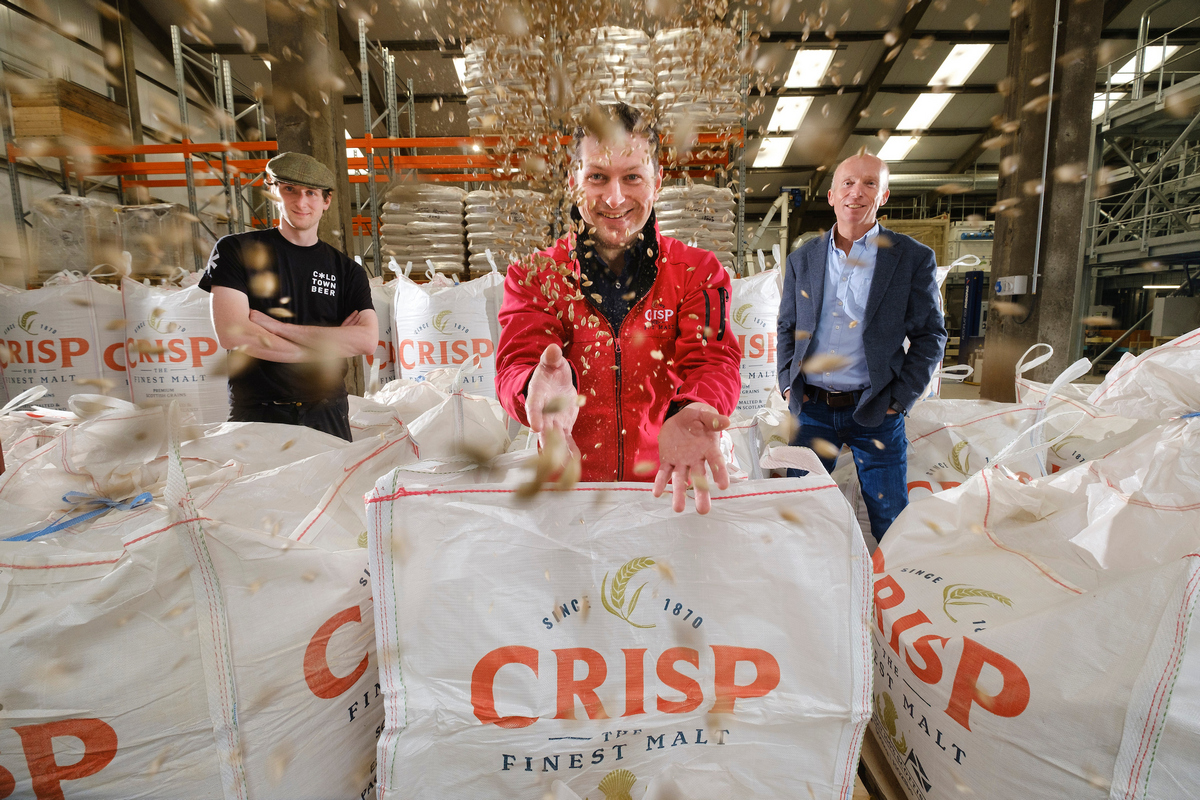Crisp Malt is increasing its support of Scottish farmers and brewers with the opening of a £2m packaging line in Alloa.

Colin Johnston, Crisp Malt’s craft brewing and distilling sales manager (centre) with Ed Evans (left), of Cold Town Beer, and Jpo
The state-of-the-art facility provides brewers with a new opportunity to buy barley that has been grown, malted, and packaged in Scotland. Previously, most Scottish brewers were buying malt from England, or using malt that had been produced in Scotland, bagged in England, and then trucked back to Scotland.
Crisp’s craft brewing and distilling sales manager, Colin Johnston, said: “The investment comes as a response from brewers for a more sustainable, more Scottish supply chain, and also as part of our endeavours to reduce our carbon footprint.”
The Scotland Food & Drink strategic report on the brewing sector (Brewing Up A Storm, December 2018) set a goal for the sector to reduce its environmental impact, and highlighted a lack of local product in the supply chain.
Colin said: “Our new facility will help address these goals. Bagging Scottish malt in Scotland will save up to 35,000 HGV miles a year, significantly lowering carbon emissions, as well as supporting breweries with local sourcing.”
The new packaging line is based at Alloa, where the company produces almost 30,000 tonnes of malt a year. Whole or crushed malt from the region’s finest barley is now being packaged into 25kg bags, and whole malt into 500kg and 1 tonne bags for brewers of all sizes.
Hilary Jones, chair of Scotland Food & Drink’s Brewing Industry Leadership Group, said: “We really welcome this response to one of our recommendations for unblocking barriers to growth for brewers in Scotland.
“The craft sector in particular has been crying out for Scottish-sourced small batches of malt, in bags rather than through bulk delivery. This is great news.”
The new facility furthers Crisp’s local sourcing policy and its commitment to supporting Scottish farming. All of the barley for its Alloa maltings is sourced from farms within the nearby counties of Fife, Perthshire, Angus, Aberdeenshire, and Morayshire.
‘Farmers love to see the identity of barley preserved, as part of the story of the beer’
John Hutcheson, who grows barley for Crisp in Dunfermline — less than 20 miles from the maltings — said: “We’re keen to work with companies committed to developing a lasting relationship and shortening the supply chain.
“It’s good to know that our barley stays in Scotland and that, through Crisp, there is a direct connection with Scottish breweries. Consumers are interested in ingredients and a local supply chain that can be tracked from field to beer.
“Farmers, too, love to see the identity of the barley preserved, not just for the malting process, but as part of the story of the beer itself.”
Crisp’s investment in infrastructure comes at a pertinent time. Not only is it during the company’s 150th anniversary year; it also follows a period of lockdown, when everyone’s awareness and appreciation of supply chains, localism, and national economies (in this case Scottish) grew.
There are more than 130 breweries spread across the mainland and islands of Scotland, most already interested in a more sustainable supply chain.



